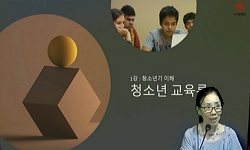본 연구는 갈등과 혐오의 사회를 해결할 방안으로 가치를 제시한다. 가치는 외집단에 대해 긍정적인 태도를 갖게 하거나 친사회적 행동을 증진할 수 있기 때문이다. 개인은 사회화를 통해 ...
http://chineseinput.net/에서 pinyin(병음)방식으로 중국어를 변환할 수 있습니다.
변환된 중국어를 복사하여 사용하시면 됩니다.
- 中文 을 입력하시려면 zhongwen을 입력하시고 space를누르시면됩니다.
- 北京 을 입력하시려면 beijing을 입력하시고 space를 누르시면 됩니다.
https://www.riss.kr/link?id=A107879699
- 저자
- 발행기관
- 학술지명
- 권호사항
-
발행연도
2021
-
작성언어
Korean
- 주제어
-
등재정보
KCI등재
-
자료형태
학술저널
-
수록면
101-129(29쪽)
-
KCI 피인용횟수
0
- 제공처
- 소장기관
-
0
상세조회 -
0
다운로드
부가정보
국문 초록 (Abstract)
본 연구는 갈등과 혐오의 사회를 해결할 방안으로 가치를 제시한다. 가치는 외집단에 대해 긍정적인 태도를 갖게 하거나 친사회적 행동을 증진할 수 있기 때문이다. 개인은 사회화를 통해 문화적 가치를 학습하는데, 어떤 사회적 네트워크에 속해있는지에 따라 학습하는 가치가 달라진다. 특히 환경이 달라지면 그 환경에 적응하고 동일시하는 과정에서 새로운 가치를 학습하게 된다. 청소년기는 가치가 확정되지 않은 상태이고, 진급 및 진학 과정에 사회적 네트워크가 크게 변화한다는 점에서 가치 변화가 활발하게 발생할 것으로 예상할 수 있다. 본 연구는 청소년기 사회적 네트워크 변화가 가치 변화에 미치는 영향을 확인하여 가치를 더 잘 이해하는 것을 목적으로 한다. 이를 위해 한국아동·청소년패널조사 2010의 초등학교 4학년 패널 1,583명을 사용하였다. 4차(2013년), 6차(2015년), 7차(2016년) 데이터로 임의효과 모형을 사용하여 분석한 결과, 연령이 증가함에 따라 친사회적 가치가 증가하다 감소하는 것으로 나타났다. 고등학교 진학 이후 경쟁을 강조하는 사회 분위기가 반영되었기 때문으로 보인다. 어머니의 교육수준과 가구 소득이 높을수록 탈물질적 가치가 높아진다는 기존 연구를 지지하는 결과도 나타났다. 반사회적 네트워크는 개인의 친사회적 가치를 감소시켰고, 사회적 지지 네트워크의 부재는 개인 초점 가치를 갖게 만드는 것으로 나타났다. 또한, 한국 사회에서도 지역사회와 긍정적 관계를 맺는 것이 친사회적 가치를 증가시킨다는 것을 확인하였다. 본 연구를 통해 청소년기의 가치 변화가 단순히 연령 증가라는 생물학적 요인에 국한되지 않고 변화하는 사회적 네트워크에 적응하는 과정에서 발생한다는 것을 경험적으로 확인했다는 의의가 있다.
다국어 초록 (Multilingual Abstract)
This study presents value that as a way to resolve a society of conflict and hatred, because it can lead to positive attitudes towards the outgroup or improve pro-social behavior. Individuals learn cultural values through socialization, depending on w...
This study presents value that as a way to resolve a society of conflict and hatred, because it can lead to positive attitudes towards the outgroup or improve pro-social behavior. Individuals learn cultural values through socialization, depending on what social networks they belong to. In particular, when the environments change, they can accept new values in the process of adaptation to the environments. Value changes are expected to occur actively in adolescence. This study aims to better understand the value system by identifying the impact of social network changes in adolescence. To this end, we use the data from the 4th graders data in the Korean Children and Youth Panel Survey 2010 through the random effect models. The survey years are 2013, 2015, 2016, and the number of the sample is 1,583. As age increases, pro-social value increases and decreases. maybe because of the social culture that emphasizes competition since entering high school. The results also support the previous research that the higher the mother’s education level and household income, the higher the post-material value. Anti-social networks have reduced the pro-social value of individuals, and the absence of social support networks has led to individualistic values. In addition, it could be confirmed that the neighborhood effect increases pro-social value. Through this study, we have empirically confirmed that value changes in the adolescence occur in the process of adaptation to changing social networks, not just limited to the biological factor of age growth.
목차 (Table of Contents)
- Ⅰ. 서론
- Ⅱ. 이론적 배경
- Ⅲ. 연구방법
- Ⅳ. 연구결과
- Ⅴ. 논의 및 제언
- Ⅰ. 서론
- Ⅱ. 이론적 배경
- Ⅲ. 연구방법
- Ⅳ. 연구결과
- Ⅴ. 논의 및 제언
- 참고문헌
참고문헌 (Reference)
1 박재흥, "한국의 세대 변화와 탈물질주의: 코호트 분석" 한국사회학회 46 (46): 69-95, 2012
2 김주연, "한국 노인의 사회적 연결망의 다양성과 인지기능" 한국인구학회 40 (40): 1-24, 2017
3 박치현, "탈콧 파슨스 초기 사회학에서의 ‘사회’ 개념:『사회적 행위의 구조(1937)』이전 저작들을 중심으로" 한국이론사회학회 (29) : 7-57, 2016
4 최정원, "집단따돌림 참여 역할에 따른 보편적 가치의 차이" 학습자중심교과교육학회 20 (20): 723-748, 2020
5 서지영, "연령에 따른 가치구조의 발달" 한국심리학회 산하 한국발달심리학회 25 (25): 21-44, 2012
6 김주환, "숙명적 비극의 시대, 고통의 현상학: 「조커」의 사회학" 동양사회사상학회 23 (23): 1-53, 2020
7 이희창, "사회자본이 집단가치에 미치는 영향: 한·일 양국간 비교를 중심으로" 한국정책과학학회 12 (12): 51-76, 2008
8 김경준, "부모와 자녀의 가사노동 : 자녀의 성별과 연령에 따른 모방학습(modeling)의 차이" 한국인구학회 42 (42): 1-25, 2019
9 이미숙, "단체참여와 사회자본이 사회적 가치에 미치는 영향" 대한지방자치학회 13 (13): 25-46, 2011
10 최정원, "개정된 가치묘사질문지(PVQ-R) 한국판 타당도 연구" 한국심리학회 33 (33): 553-590, 2014
1 박재흥, "한국의 세대 변화와 탈물질주의: 코호트 분석" 한국사회학회 46 (46): 69-95, 2012
2 김주연, "한국 노인의 사회적 연결망의 다양성과 인지기능" 한국인구학회 40 (40): 1-24, 2017
3 박치현, "탈콧 파슨스 초기 사회학에서의 ‘사회’ 개념:『사회적 행위의 구조(1937)』이전 저작들을 중심으로" 한국이론사회학회 (29) : 7-57, 2016
4 최정원, "집단따돌림 참여 역할에 따른 보편적 가치의 차이" 학습자중심교과교육학회 20 (20): 723-748, 2020
5 서지영, "연령에 따른 가치구조의 발달" 한국심리학회 산하 한국발달심리학회 25 (25): 21-44, 2012
6 김주환, "숙명적 비극의 시대, 고통의 현상학: 「조커」의 사회학" 동양사회사상학회 23 (23): 1-53, 2020
7 이희창, "사회자본이 집단가치에 미치는 영향: 한·일 양국간 비교를 중심으로" 한국정책과학학회 12 (12): 51-76, 2008
8 김경준, "부모와 자녀의 가사노동 : 자녀의 성별과 연령에 따른 모방학습(modeling)의 차이" 한국인구학회 42 (42): 1-25, 2019
9 이미숙, "단체참여와 사회자본이 사회적 가치에 미치는 영향" 대한지방자치학회 13 (13): 25-46, 2011
10 최정원, "개정된 가치묘사질문지(PVQ-R) 한국판 타당도 연구" 한국심리학회 33 (33): 553-590, 2014
11 Hitlin, S., "Values: Reviving a Dormant Concept" 30 : 359-393, 2004
12 Sortheix, F. M., "Values that Underlie and Undermine Well–Being: Variability across Countries" 31 (31): 187-201, 2017
13 Schwartz, S. H., "Values and Intergroup Social Motives: A Study of Israeli and German Students" 53 (53): 185-198, 1990
14 Bubeck, M., "Value Structure at an Early Age" 63 (63): 31-41, 2004
15 Ryckman, R. M., "Value Priorities in American and British Female and Male University Students" 143 (143): 127-138, 2003
16 Sagiv, L., "Value Priorities and Readiness for Out-Group Social Contact" 69 (69): 437-448, 1995
17 Prince-Gibson, E., "Value Priorities and Gender" 61 (61): 49-67, 1998
18 De Groot, J. I, "Value Orientations to Explain Beliefs Related to Environmental Significant Behavior: How to Measure Egoistic, Altruistic, and Biospheric Value Orientations" 40 (40): 330-354, 2008
19 Daniel, E., "Value Development during Adolescence: Dimensions of Change and Stability" 87 (87): 620-632, 2018
20 Schwartz, S. H., "Value Consensus and Importance: A Cross-National Study" 31 (31): 465-497, 2000
21 Schwartz, S. H., "Valores e trabalho" Editora Universidade de Brasilia 56-85, 2005
22 Schwartz, S. H., "Universals in the Content and Structure of Values:Theoretical Advances and Empirical Tests in 20 Countries" 25 : 1-65, 1992
23 Schwartz, S. H., "Toward a Universal Psychological Structure of Human Values" 53 (53): 550-, 1987
24 Kluckhohn, C., "Toward A General Theory of Action" Havard University Press 388-433, 1951
25 Vaisey, S., "Tools from Moral Psychology for Measuring Personal Moral Culture" 43 (43): 311-332, 2014
26 Parsons, T., "The structure of Social Action" The Free Press 1966
27 Bardi, A., "The Structure of Intraindividual Value Change" 97 (97): 913-929, 2009
28 Cieciuch, J., "The Stability and Change of Value Structure and Priorities in Childhood: A Longitudinal Study" 25 (25): 503-527, 2016
29 Spates, J. L., "The Sociology of Values" 9 : 27-49, 1983
30 Mannheim, K., "The Problem of Generations" 57 (57): 378-404, 1970
31 Wrong, D. H., "The Oversocialized Conception of Man in Modern Sociology" 26 (26): 183-193, 1963
32 Hitlin, S., "The New Sociology of Morality" 39 : 51-68, 2013
33 Rokeach, M., "The Nature of Human Values" Free Press 1973
34 Armsden, G. C., "The Inventory of Parent and Peer Attachment: Individual Differences and Their Relationship to Psychological Well-Being in Adolescence" 16 (16): 427-454, 1987
35 Jost, J. T., "The End of the End of Ideology" 61 (61): 651-670, 2006
36 Haidt, J., "The Emotional Dog and Its Rational Tail: A Social Intuitionist Approach to Moral Judgment" 108 (108): 814-834, 2001
37 Smith, E. S., "The Effects of Investments in Thesocial Capital of Youth on Political and Civic Behavior in Young Adulthood: A Longitudinal Analysis" 20 (20): 553-580, 1999
38 Bardi, A., "The Dual Route to Value Change:Individual Processes and Cultural Moderators" 42 (42): 271-287, 2011
39 Kohlberg, L., "The Claim to Moral Adequacy of a Highest Stage of Moral Judgment" 70 (70): 630-646, 1973
40 Miles, A., "The (re) Genesis of Values: Examining the Importance of Values for Action" 80 (80): 680-704, 2015
41 Vecchione, M., "Stability and Change of Basic Personal Values in Early Adulthood: An 8-Year Longitudinal Study" 63 : 111-122, 2016
42 Vecchione, M., "Stability and Change of Basic Personal Values in Early Adolescence: A 2-year Longitudinal Study" 88 (88): 447-463, 2020
43 Hausman, J. A., "Specification Tests in Econometrics" 46 (46): 1251-1271, 1978
44 Vaisey, S., "Socrates, Skinner, and Aristotle: Three Ways of Thinking About Culture in Action" 23 (23): 603-613, 2008
45 Rosenberg, M., "Society and the Adolescent Self-Image Princeton" Princeton University Press 1965
46 Akers, R. L., "Social Learning and Deviant Behavior: A Specific Test of a General Theory" 44 (44): 187-214, 1979
47 Clark, T. S., "Should I Use Fixed or Random Effects" 3 (3): 399-408, 2015
48 Schwartz, S. H., "Sex Differences in Value Priorities:Cross-Cultural and Multimethod Studies" 89 (89): 1010-1028, 2005
49 김연신, "Schwartz의 보편적 가치 이론의 적용 타당성 연구:한국대학생을 대상으로" 한국사회및성격심리학회 23 (23): 1-16, 2009
50 Peterson, R. A., "Revitalizing the Culture Concept" 5 : 137-166, 1979
51 Harding, D. J., "Rethinking the Cultural Context of Schooling Decisions in Disadvantaged Neighborhoods: From Deviant Subculture to Cultural Heterogeneity" 84 (84): 322-339, 2011
52 Schwartz, S. H., "Refining the Theory of Basic Individual Values" 103 (103): 663-688, 2012
53 Caprara, G. V., "Prosocial Agency: The Contribution of Values and Self-Efficacy Beliefs to Prosocial Behavior across Ages" 26 (26): 218-239, 2007
54 Parsons, T., "Prolegomena to a Theory of Social Institutions" 55 (55): 319-333, 1990
55 Grusec, J. E., "Parenting and Children's Internalization of Values: A Handbook of Contemporary Theory" John Wiley & Sons Inc 1997
56 Knafo, A., "Parenting and Adolescents' Accuracy in Perceiving Parental Values" 74 (74): 595-611, 2003
57 Martin, J. L., "On The Other Side of Values" 126 (126): 52-98, 2020
58 Derrida, J., "Of Grammatology" Johns Hopkins University Press 1997
59 Vaisey, S., "Motivation and Justification: A Dual-Process Model of Culture in Action" 114 (114): 1675-1715, 2009
60 Verplanken, B., "Motivated Decision Making:Effects of Activation and Self-Centrality of Values on Choices and Behavior" 82 (82): 434-447, 2002
61 Menesini, E., "Morality, Values, Traditional Bullying, and Cyberbullying in Adolescence" 31 (31): 1-14, 2013
62 Hardy, S. A., "Moral Identity: What Is It, How Does It Develop, and Is It Linked to Moral Action?" 5 (5): 212-218, 2011
63 Paciello, M., "Moral Dilemma in Adolescence: The Role of Values, Prosocial Moral Reasoning and Moral Disengagement in Helping Decision Making" 10 (10): 190-205, 2013
64 Inglehart, R, "Modernization, Cultural Change, and The Persistence of Traditional Values" 65 (65): 19-51, 2000
65 Inglehart, R., "Modernization and Postmodernization: Cultural, Economic, and Political Change in 43 Societies" Princeton University Press 1997
66 Kolb, W. L., "Modem Social Theory in Continuity and Change" Dryden 93-132, 1957
67 Schwartz, S. H., "Influences of Adaptation to Communist Rule on Value Priorities in Eastern Europe" 18 (18): 385-410, 1997
68 Patrick, R. B., "Inductive Discipline, Parental Expression of Disappointed Expectations, and Moral Identity in Adolescence" 41 (41): 973-983, 2012
69 김경준, "IMF 외환위기 이후 한국 사회의 탈도덕화: 공평성, 순수성 변화를 중심으로" 한국사회학회 55 (55): 29-59, 2021
70 McArdle, J. J., "Handbook of psychology: Research methods in psychology, Vol. 2" John Wiley & Sons Inc 447-480, 2003
71 Sampson, R. J., "Great American City : Chicago and the Enduring Neighborhood Effect" University of Chicago Press 2012
72 Egri, C. P., "Generation Cohorts and Personal Values: A Comparison of China and the United States" 15 (15): 210-220, 2004
73 Schwartz, S. H., "Extending the Cross-Cultural Validity of the Theory of Basic Human Values with a Different Method of Measurement" 32 (32): 519-542, 2001
74 Hofmann-Towfigh, N., "Do Students' Values Change in Different Types of Schools?" 36 (36): 453-473, 2007
75 Vaisey, S., "Can Cultural Worldviews Influence Network Composition?" 88 (88): 1595-1618, 2010
76 Schwartz, S. H., "Basic Human Values: Theory, Measurement, and Applications" 47 (47): 929-968, 2006
77 Döring, A. K., "Assessing Values at an Early Age: The Picture-Based Value Survey for Children (PBVS–C)" 92 (92): 439-448, 2010
78 Schwartz, S. H., "Are There Universal Aspects in the Structure and Contents of Human Values?" 50 (50): 19-45, 1994
79 Kahle, L. R., "Alternative Measurement Approaches to Consumer Values: The List of Values (LOV) and Values and Life Style (VALS)" 13 (13): 405-409, 1986
80 Carolina Population Center, "Adolescent to Adult Health (ADD Health)"
81 Maslow, A. H., "A Theory of Human Motivation" 50 (50): 370-396, 1943
82 Leong, C. H., "A Multilevel Research Framework for the Analyses of Attitudes toward Immigrants" 32 (32): 115-129, 2008
동일학술지(권/호) 다른 논문
-
중고령자 재취업 결정 요인 분석: 임금 및 비임금 일자리 경쟁 모형을 중심으로
- 한국인구학회
- 이주영(Lee, Jooyoung)
- 2021
- KCI등재
-
노인 재가돌봄 상황에서 공식돌봄서비스는 어떻게 활용되나?: 가족주돌봄제공자의 관점을 중심으로
- 한국인구학회
- 차승은(Cha, Seung-Eun)
- 2021
- KCI등재
-
외국인 어머니의 모국문화정체성, 차별인식과 자녀의 회귀유학: 어머니의 모국어에 따른 인과구조 차이의 분석
- 한국인구학회
- 김두섭(Kim, Doo-Sub)
- 2021
- KCI등재
-
청년층의 기회 공정성 인식 분절화: 지역과 젠더 관점을 중심으로
- 한국인구학회
- 이희정(Lee, Hee-Jeong)
- 2021
- KCI등재
분석정보
인용정보 인용지수 설명보기
학술지 이력
| 연월일 | 이력구분 | 이력상세 | 등재구분 |
|---|---|---|---|
| 2027 | 평가예정 | 재인증평가 신청대상 (재인증) | |
| 2021-01-01 | 평가 | 등재학술지 유지 (재인증) |  |
| 2018-01-01 | 평가 | 등재학술지 유지 (등재유지) |  |
| 2015-01-01 | 평가 | 등재학술지 유지 (등재유지) |  |
| 2013-01-01 | 평가 | 등재 1차 FAIL (등재유지) |  |
| 2010-01-01 | 평가 | 등재학술지 유지 (등재유지) |  |
| 2008-01-01 | 평가 | 등재 1차 FAIL (등재유지) |  |
| 2006-01-01 | 평가 | 등재학술지 유지 (등재유지) |  |
| 2004-01-01 | 평가 | 등재학술지 유지 (등재유지) |  |
| 2001-07-01 | 평가 | 등재학술지 선정 (등재후보2차) |  |
| 1999-01-01 | 평가 | 등재후보학술지 선정 (신규평가) |  |
학술지 인용정보
| 기준연도 | WOS-KCI 통합IF(2년) | KCIF(2년) | KCIF(3년) |
|---|---|---|---|
| 2016 | 1.34 | 1.34 | 1.65 |
| KCIF(4년) | KCIF(5년) | 중심성지수(3년) | 즉시성지수 |
| 1.86 | 2.07 | 2.564 | 0.4 |




 DBpia
DBpia







